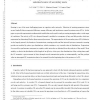Free Online Productivity Tools
i2Speak
i2Symbol
i2OCR
iTex2Img
iWeb2Print
iWeb2Shot
i2Type
iPdf2Split
iPdf2Merge
i2Bopomofo
i2Arabic
i2Style
i2Image
i2PDF
iLatex2Rtf
Sci2ools
COMCOM
2016
2016
Discrete time analysis of cognitive radio networks with imperfect sensing and saturated source of secondary users
Sensing is one of the most challenging issues in cognitive radio networks. Selection of sensing parameters raises several tradeoffs between spectral efficiency, energy efficiency and interference caused to primary users (PUs). In this paper we provide representative mathematical models that can be used to analyze sensing strategies under a wide range of conditions. The activity of PUs in a licensed channel is modeled as a sequence of busy and idle periods, which are represented as alternating Markov phase renewal processes. The representation of the secondary users (SUs) behavior is also largely general: the duration of transmissions, sensing periods and the intervals between consecutive sensing periods are modeled by phase type distributions, which constitute a very versatile class of distributions. Expressions for several key performance measures in cognitive radio networks are obtained from the analysis of the model. Most notably, we derive the distribution of the length of an eï¬...
| Added | 31 Mar 2016 |
| Updated | 31 Mar 2016 |
| Type | Journal |
| Year | 2016 |
| Where | COMCOM |
| Authors | Attahiru Sule Alfa, Vicent Pla, Jorge Martínez-Bauset, Vicente Casares Giner |
Comments (0)

